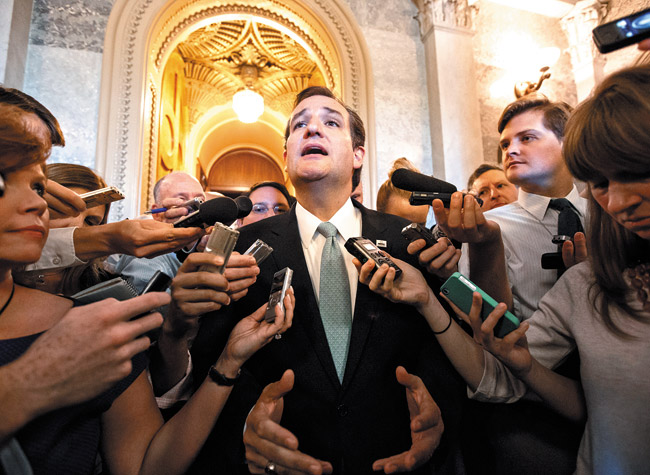Polarization Of American Politics

Sen. Ted Cruz, R-Texas, emerges from the Senate Chamber after his overnight crusade railing against the Affordable Care Act, popularly known as Obamacare, Sept. 25 at the Capitol in Washington, D.C. Cruz and other conservative Republicans were trying to delay a must-pass spending bill AP Photo/J. Scott Applewhite
On the eve of yet another threatened shutdown of the federal government, a young colleague at the University of Hawaii-West Oahu approached me in the hallway and asked plaintively, “Dr. Dan, why can’t our politicians do anything anymore? Has it always been like this?”
Now, I like this young woman a lot. She’s a hardworking, happily married mother of two young children – and a concerned citizen to boot.
But little does she know how dangerous it is to ask such an open-ended question of a professor, particularly of a voluble, long-winded professor whose ancestors came from the old sod. We don’t provide answers to questions; we offer long-winded lectures instead.
But we were in the middle of a hallway, and even I knew a lecture wouldn’t do. I mumbled something about the “polarization of American politics” and hurried away.
You, poor reader, get the lecture, starting with that polarization business.
It’s nothing new. During the Great Depression of the 1930s, Republicans and Democrats seldom found middle ground when it came to the key programs of Franklin Roosevelt’s New Deal. Republicans called the president an expletive-deleted commie at every opportunity, public and private.
Democrats knew huge majorities in both houses of Congress, however, and FDR thus had the votes to make his agenda the law of the land.
Roosevelt famously stated in his first inaugural address that “the only thing we have to fear is fear itself.” Fear, however, was his great ally. The unemployment rate stood at 25 percent in March 1933, banks teetered on the edge of ruin in cities and towns across the country, and beggars at the back door became a familiar part of the national demographic.
Fear persuaded the American people to try anything, from a pension plan for old folks to government-mandated collective bargaining for organized labor to huge government building projects to stimulate the economy – and much, much more.
Our recent Great Recession has engendered nowhere near that depth of fear. The unemployment rate peaked at 12 percent, insufficient to bring the bankers who brought it on to anything save a bailout. Fear helped President Barack Obama’s stimulus through Congress, although economists pronounced it too small. Republicans quickly reviled it as budget-busting and deficit-building, Obama himself as a socialist, commie and worse.
Odd, that last. If Obama’s a commie, he’s certainly a poor one. Commies are supposed to redistribute wealth from those who have to those who have not. As Congress debated a budget extension last week, the gap between rich and poor yawned as wide as it had in 1928 on the eve of the Great Depression.
The debate turned into a one-man talkfest by Ted Cruz, a newly elected Republican senator from Texas who believes not funding the Affordable Care Act more important than shutting down the United States government. He joined the House Republican majority in that conviction; its members voted 40 times to repeal Obamacare – 40 times. It sounds downright biblical. So, too, is the bipartisan penchant of American political parties to self-destruct.
But that’s another lecture for another day.





